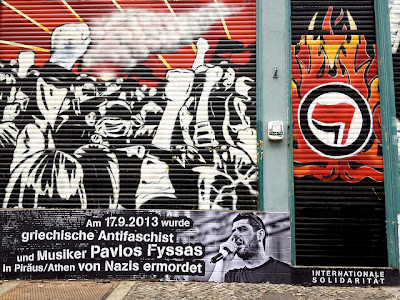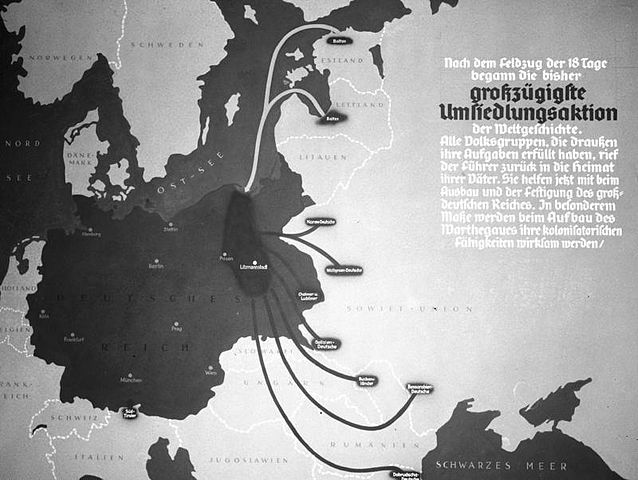The November 2013 issue of Interface includes two interesting articles about the far right. Interface is an interesting project -- an international, multilingual journal that brings together activists and academics to share knowledge "for and about social movements." The journal's politics are broadly leftist. It's freely available online and has been publishing for about five years.
In a statement titled "Who We Want to Reach," the Interface editors say that they don't want to produce either "pure" theory or simply descriptive accounts. Rather, they aim to contribute to "praxis-centered theorizing" on social movement activity. If the two articles that caught my attention are representative, then the results are promising but uneven. One of the articles does a much better job than the other at providing theoretical analysis that's useful for guiding political work.
The two articles are:
Schlembach's article discusses an important sub-current within the German far right that has emerged over the past decade. Autonomous Nationalists are neo-nazi street fighters who have adopted many of the styles and symbols of anarchists and other leftists. They've replaced skinhead-style bomber jackets and combat boots with black hoodies and baseball caps, and favor hip hop graffiti art over German Fraktur. They also emphasize autonomy, decentralism, and DIY culture rather than discipline and honor, are skeptical of personality cults, and promote a "spontaneous aggressiveness" at demonstrations (303) that can put them at odds not only with anti-fascists and the police but even with more established fascist organizations. Autonomous Nationalists have an uneasy relationship with the National Democrat Party (NPD) and other established fascist parties. And, Schlembach reports, while far right violence in Germany has primarily targeted immigrants and asylum seekers, Autonomous Nationalist violence more often targets leftists.
Many far rightists denounce corporate globalization and even capitalism, but some Autonomous Nationalists "call for boycotts of well known neo-Nazi clothing brands that produce clothing abroad [and] attack them for selling out and turning into 'capitalist companies'" (303). And while international networking among fascists is common, "the Autonomous Nationalists make special efforts to integrate foreign activists into their activities in Germany. This, together with the use of new social media and the English language, results in a fast dissemination of ideas and repertoires to other European countries" (312).
The Autonomous Nationalists aren't very numerous (in 2009, the German government estimated they formed about 10 percent of the neo-nazi movement, with 400-500 activists) but they are important because they show vividly that it's dangerous to equate progressive politics with any specific style or even with more substantive values such as autonomy or internationalism. Autonomous Nationalists are the latest version, but fascists have been appropriating leftist politics in distorted form since the time of Mussolini. It's a basic part of what they do.
Schlembach's article is quite useful for its reportage about the Autonomous Nationalists. Ironically, given the article's academic tone, its analysis is much weaker. Despite a few references to other fascists, Schlembach does little to place the Autonomous Nationalists in a larger historical or political context. He makes no effort to relate Autonomous Nationalism to parallel developments such as National Anarchism, which also borrows heavily from current leftist movements. And while the article describes Autonomous Nationalists' racial politics as "ethno-pluralist," there's no mention of the European New Right, which is where the term ethno-pluralism comes from.
To Schlembach, "the principles of networked, decentralized and individualistic organization stand in complete opposition to the stated aim of a national organic order" and thus Autonomous Nationalists' means and ends are in "obvious conflict" (314). That's true if we assume that the fascist ideal is a centralized, totalitarian state a la Hitler's Germany -- in other words, if we overlook the European New Right, leaderless resistance, white separatism, National Anarchism, and many other developments in fascist politics over the past thirty years.
I'm glad that Interface published this article and is addressing current-day rightist tendencies such as Autonomous Nationalism. But as an example of practice-centered theorizing, Schlembach's article falls short. To explore these developments usefully requires a broader and deeper view of far right movements and a more inclusive and dynamic conception of fascism.
In a statement titled "Who We Want to Reach," the Interface editors say that they don't want to produce either "pure" theory or simply descriptive accounts. Rather, they aim to contribute to "praxis-centered theorizing" on social movement activity. If the two articles that caught my attention are representative, then the results are promising but uneven. One of the articles does a much better job than the other at providing theoretical analysis that's useful for guiding political work.
The two articles are:
- "The 'Autonomous Nationalists': new developments and contradictions in the German neo-Nazi movement" by Raphael Schlembach, and
- "The trouble with eco-politics of localism: too close to the far right? Debates on ecology and globalization," by Mi Park.
Schlembach's article discusses an important sub-current within the German far right that has emerged over the past decade. Autonomous Nationalists are neo-nazi street fighters who have adopted many of the styles and symbols of anarchists and other leftists. They've replaced skinhead-style bomber jackets and combat boots with black hoodies and baseball caps, and favor hip hop graffiti art over German Fraktur. They also emphasize autonomy, decentralism, and DIY culture rather than discipline and honor, are skeptical of personality cults, and promote a "spontaneous aggressiveness" at demonstrations (303) that can put them at odds not only with anti-fascists and the police but even with more established fascist organizations. Autonomous Nationalists have an uneasy relationship with the National Democrat Party (NPD) and other established fascist parties. And, Schlembach reports, while far right violence in Germany has primarily targeted immigrants and asylum seekers, Autonomous Nationalist violence more often targets leftists.
Many far rightists denounce corporate globalization and even capitalism, but some Autonomous Nationalists "call for boycotts of well known neo-Nazi clothing brands that produce clothing abroad [and] attack them for selling out and turning into 'capitalist companies'" (303). And while international networking among fascists is common, "the Autonomous Nationalists make special efforts to integrate foreign activists into their activities in Germany. This, together with the use of new social media and the English language, results in a fast dissemination of ideas and repertoires to other European countries" (312).
The Autonomous Nationalists aren't very numerous (in 2009, the German government estimated they formed about 10 percent of the neo-nazi movement, with 400-500 activists) but they are important because they show vividly that it's dangerous to equate progressive politics with any specific style or even with more substantive values such as autonomy or internationalism. Autonomous Nationalists are the latest version, but fascists have been appropriating leftist politics in distorted form since the time of Mussolini. It's a basic part of what they do.
Schlembach's article is quite useful for its reportage about the Autonomous Nationalists. Ironically, given the article's academic tone, its analysis is much weaker. Despite a few references to other fascists, Schlembach does little to place the Autonomous Nationalists in a larger historical or political context. He makes no effort to relate Autonomous Nationalism to parallel developments such as National Anarchism, which also borrows heavily from current leftist movements. And while the article describes Autonomous Nationalists' racial politics as "ethno-pluralist," there's no mention of the European New Right, which is where the term ethno-pluralism comes from.
To Schlembach, "the principles of networked, decentralized and individualistic organization stand in complete opposition to the stated aim of a national organic order" and thus Autonomous Nationalists' means and ends are in "obvious conflict" (314). That's true if we assume that the fascist ideal is a centralized, totalitarian state a la Hitler's Germany -- in other words, if we overlook the European New Right, leaderless resistance, white separatism, National Anarchism, and many other developments in fascist politics over the past thirty years.
I'm glad that Interface published this article and is addressing current-day rightist tendencies such as Autonomous Nationalism. But as an example of practice-centered theorizing, Schlembach's article falls short. To explore these developments usefully requires a broader and deeper view of far right movements and a more inclusive and dynamic conception of fascism.




